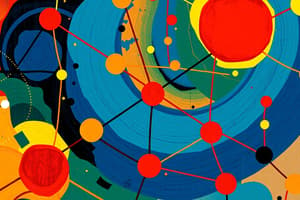Podcast
Questions and Answers
What are The Five Classics?
What are The Five Classics?
- Conversations and sayings of Confucius
- Collection of moral lessons
- Book of rites
- Earliest piece of Chinese literature (correct)
Who are the creators of the Five Classics?
Who are the creators of the Five Classics?
Sages
What does the I Ching contain?
What does the I Ching contain?
Questions put to gods and ancestral spirits about the affairs of the living
What does the Shu Ching represent?
What does the Shu Ching represent?
What is the main theme of the Shih Ching?
What is the main theme of the Shih Ching?
What is the focus of the Li Chi?
What is the focus of the Li Chi?
What does the Ch'un-ch'iu document?
What does the Ch'un-ch'iu document?
Who produced The Four Books?
Who produced The Four Books?
What is the Lun yu known for?
What is the Lun yu known for?
Who is Mencius in relation to Confucianism?
Who is Mencius in relation to Confucianism?
What does Chung-Tung emphasize?
What does Chung-Tung emphasize?
What is the focus of Ta hsueh?
What is the focus of Ta hsueh?
Flashcards are hidden until you start studying
Study Notes
The Five Classics
- The earliest known collection of Chinese literature.
- The term “Classic” is derived from a word meaning weaving, indicating the cultural significance of these texts.
Creators of the Five Classics
- Composed by “sages” who are believed to have understood T'ien, the supreme moral authority in the universe.
- These sages documented their insights regarding the moral order in the Classics.
I Ching (Classic of Changes)
- A divination text that poses questions to deities and ancestral spirits concerning human affairs.
Shu Ching (Classic of History)
- A compilation of writings featuring statements from rulers spanning a 900-year period, from sage kings to the founders of the Chou Dynasty.
- Highlights virtuous rulers as models of moral leadership.
Shih Ching (Classic of Poetry)
- A collection of over 300 poems that encapsulate moral teachings.
- Reinforces the moral authority associated with the way of T'ien.
Li Chi (Class of Rites)
- Emphasizes the significance of rituals in establishing societal and individual order.
Ch'un-ch'iu (The Spring and Autumn Annals)
- Chronicles events that took place from 722 to 479 BCE in the State of Lu, where Confucius was born.
The Four Books
- Developed by Neo-Confucian philosopher Chu Hsi.
- Merges writings from key figures in the Confucian tradition with select texts from the Classics.
Lun yu (Confucian Analects)
- A compilation of dialogues and sayings delivered by Confucius during discussions with his students.
Meng Tzu (Mencius)
- Writings of the early Confucian thinker Mencius, later included in the Four Books, granting him elevated status.
- Recognized as the official interpreter of Confucius' teachings.
Chung-Tung (Doctrine of the Mean)
- Found within the Book of Rites, it emphasizes the importance of individual learning in harmony with the cosmos, underpinned by the way of T'ien.
Ta hsueh (Great Learning)
- Also located in the Book of Rites, it discusses achieving worldly peace through personal moral development and education.
Studying That Suits You
Use AI to generate personalized quizzes and flashcards to suit your learning preferences.




